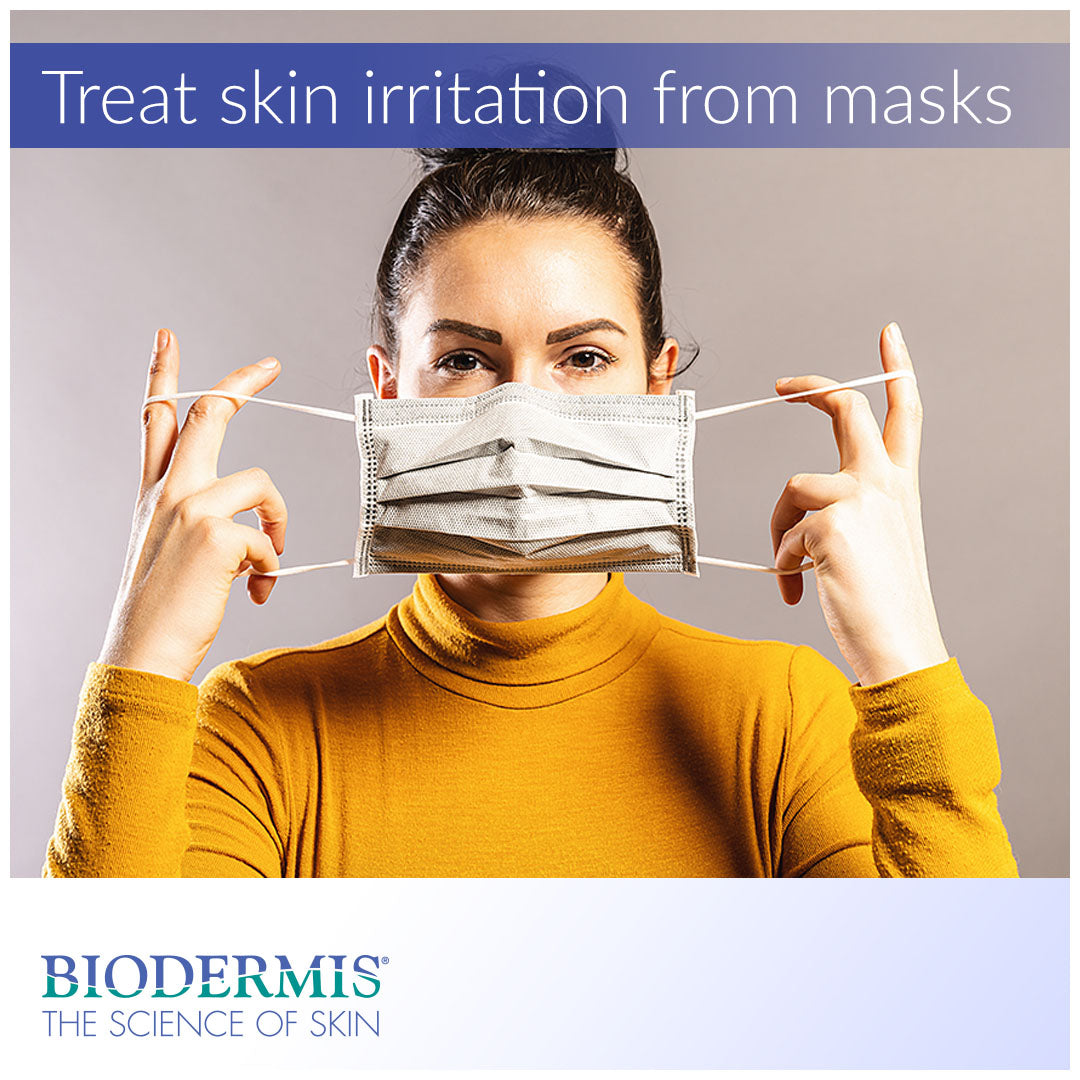With the recent pandemic outbreak from COVID-19, many cities around the world are requiring the use of face masks in public areas. Face masks should fit snug around the nose and mouth for the best protection. While face coverings are meant for our own good, they can cause minor irritations or skin problems in people with sensitive skin. While this should not deter you from keeping yourself and others safe, there are steps you can take to ensure that your skin remains unaffected from the constant use of a mask.
The primary concern when using a face mask is the friction that it causes when the mask rubs against the skin. This can lead to irritation and dryness around the bridge of the nose, cheeks, chin, or behind the ears. One way to reduce the risk of irritation is to refrain from adjusting the mask while worn. Adjusting your mask in public is never a good idea because it risks contamination as well as friction to the skin. If your face mask is too loose, try looking for one that fits more snugly. As a last resort, you can switch over to a cloth mask; while these provide less protection, they may cause less irritation to the skin.
If masks are too tight, they can strangulate the skin and leave red marks on the face. Healthcare professionals are all too familiar with this because of the long hours they work while wearing face protection. Tight masks help guard the user from airborne particles entering the nose or mouth, so there is good reason to wear them. Dr. Dawn Davis, a Mayo Clinic dermatologist, recommends healthcare workers to put a coating of zinc oxide on the face underneath the mask. That is because it is an effective anti-inflammatory agent that will not interfere with protection provided by the mask. If you are not a healthcare worker but still prefer to wear tight masks in public, you may benefit from placing a buffer between the edges of the mask and your skin. Silicone gel strips work well for this purpose because they are transparent, durable, and comfortable. Silicone strips can be reused and cut to fit the length of the mask.
Face masks trap in humidity from breathing, potentially causing your face to become humid or even sweaty. For some people, this may lead to a flare-up of acne or rosacea. It is recommended to wash your face at least twice daily, one in the morning before you put on your mask and later in the day, when you remove it. In addition to gentle face washing with soap and water, the application of moisturizer to the face will help to minimize flare-ups from wearing masks. After several uses, if the mask cannot be machine or hand-washed, it should be switched out for a new one.
The primary concern when using a face mask is the friction that it causes when the mask rubs against the skin. This can lead to irritation and dryness around the bridge of the nose, cheeks, chin, or behind the ears. One way to reduce the risk of irritation is to refrain from adjusting the mask while worn. Adjusting your mask in public is never a good idea because it risks contamination as well as friction to the skin. If your face mask is too loose, try looking for one that fits more snugly. As a last resort, you can switch over to a cloth mask; while these provide less protection, they may cause less irritation to the skin.
If masks are too tight, they can strangulate the skin and leave red marks on the face. Healthcare professionals are all too familiar with this because of the long hours they work while wearing face protection. Tight masks help guard the user from airborne particles entering the nose or mouth, so there is good reason to wear them. Dr. Dawn Davis, a Mayo Clinic dermatologist, recommends healthcare workers to put a coating of zinc oxide on the face underneath the mask. That is because it is an effective anti-inflammatory agent that will not interfere with protection provided by the mask. If you are not a healthcare worker but still prefer to wear tight masks in public, you may benefit from placing a buffer between the edges of the mask and your skin. Silicone gel strips work well for this purpose because they are transparent, durable, and comfortable. Silicone strips can be reused and cut to fit the length of the mask.
Face masks trap in humidity from breathing, potentially causing your face to become humid or even sweaty. For some people, this may lead to a flare-up of acne or rosacea. It is recommended to wash your face at least twice daily, one in the morning before you put on your mask and later in the day, when you remove it. In addition to gentle face washing with soap and water, the application of moisturizer to the face will help to minimize flare-ups from wearing masks. After several uses, if the mask cannot be machine or hand-washed, it should be switched out for a new one.
Biodermis is an innovative market leader with 30 years of expertise in the medical silicone industry. Visit Biodermis.com today to explore a complete range of scar management and post-operative care solutions.
PHYSICIANS AND MEDICAL PROFESSIONALS: REFER OR RESELL?
Biodermis offers custom tailored referral programs designed to simplify and reduce the cost of your patients' post-op care. Additionally, we offer professional pricing if you opt to retail our products. Give us a call at 800.322.3729, and we will be happy to provide additional details on these programs.





